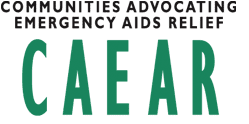
Google Groups: Part A Community | Part C Community | Grantee Resources




"Circumstances may change, but the work of compassion must continue."
—Senator Edward Kennedy, (D-MA), 1980 Democratic ConventionStatement of Ernest Hopkins, Chair, CAEAR Coalition, on the Death of Senator Edward M. Kennedy, Senior United Sates Senator from Massachusetts
August 26, 2009
CAEAR Coalition joins the United States of America and nations around the world in mourning the passing of Senator Edward M. Kennedy and honoring his legacy of service to the disenfranchised and most vulnerable among us.
In 1990, people living with HIV/AIDS faced tremendous stigma, discrimination, and marginalization. The U.S. had yet to effectively respond to the deadly AIDS epidemic that was devastating gay men, hemophiliacs and people of color. That year, Senator Kennedy’s passion and commitment drove the passage of the Ryan White CARE Act. Almost 20 years later, the program has provided care to hundreds of thousands of people living with HIV/AIDS and remains the cornerstone of the nation’s response to the domestic HIV epidemic. From the early days of the AIDS epidemic, Senator Kennedy demonstrated himself to be an ally and fearless advocate for people living with HIV/AIDS.
Speaking of Ryan White on the Senate floor, Senator Kennedy said, "What he was doing was reaching out in the true spirit of the American character to recognize that there were people who were suffering."
His eloquent tribute to Ryan's courage and character is equally descriptive of Senator Kennedy himself. Throughout his career, Senator Kennedy was driven by a deep well of compassion and an unwavering sense of shared humanity with those who struggle and strive for an education, gender equality, a job, equal access for the disabled, medical care, a place to live, and food to eat. His legacy is a stirring reminder of the contributions one person can make when committed to strong ideals and a strong faith, and dedicated to public service.
In the weeks and months ahead, we will honor that legacy by advocating for extension of the Ryan White HIV/AIDS Treatment Modernization Act prior to its sunset on September 30, 2009, and for reform of the nation's health care system, ensuring it provides every person with comprehensive access to the medical care and supportive services required to lead healthy, productive lives. Senator Kennedy's office has prepared a list of his many legislative accomplishments, available at http://kennedy.senate.gov. Below are the accomplishments related specifically to HIV/AIDS.
FROM: "ACCOMPLISHMENTS OF SENATOR KENNEDY: 1962-2009"
Securing Funding to Support HIV/AIDS Treatment and Care
Senator Kennedy sponsored legislation in 1986 to establish a network of education and outpatient services for individuals infected with the AIDS virus. Two years later, he successfully secured funding for the first substantial federal initiative related to AIDS treatment. Included in a catch-all health spending measure, Kennedy’s provisions expanded home and community care of victims, made for easier access to experimental drugs, and created a new national commission to establish AIDS policy.
In 1990, Senator Kennedy and Senator Orrin Hatch introduced the groundbreaking Ryan White Comprehensive AIDS Resources Emergency Act, which created the single largest federal program for people with HIV/AIDS in the U.S. The law provided emergency relief to thirteen cities hardest hit by the AIDS epidemic as well as substantial assistance to all states to develop effective and cost-efficient AIDS care programs, aimed particularly at early diagnosis and home care.
Other services included in the bill were drug treatment, dental care, substance abuse treatment, and outpatient mental health care. The program has been authorized by Congress three times since it was first created.
In 1991, Kennedy sponsored legislation to reorganize the Alcohol, Drug Abuse, and Mental Health Administration. Specifically, it separated the previously combined treatment and research branches of the department, which improved the capacity to effectively address both the prevention and treatment of substance abuse and mental health.
The Ryan White CARE Act reauthorization of 2000 reaffirmed Senator Kennedy's commitment to providing access for persons with HIV disease to life-sustaining medications, medical care and other essential services. The Act authorized nearly $9 billion in HIV/AIDS services over the next five years. According to the Centers for Disease Control and Prevention, at that time, AIDS had claimed over 425,000 lives so far in the United States and the epidemic was infecting an additional 40,000 people each year. There is good reason to be encouraged by the medical advances over the past ten years—but HIV/AIDS is hitting hardest in areas where knowledge about the disease is limited and poverty is high. The disease continues to claim the most vulnerable Americans, especially women, youth and minorities.
In 2006, Senator Kennedy and Senator Enzi led the last reauthorization of Ryan White with a clear focus on bringing this legislation into the 21st century. The law now ensures that money follows the infection no matter where you live; that families are given the help they need to support a family member living with HIV; and that medical care, including drug therapy, as well as support services are a priority.
An estimated 800,000 to 900,000 Americans were living with HIV/AIDS in 2009. The federal government estimates that at least 500,000 persons rely in part or solely on CARE Act services in managing their HIV disease. The passage of this landmark legislation means hundreds of thousands of persons who would be unable to afford care otherwise will continue to have hope for quality care.
The law increases targeted resources to states, heavily affected metropolitan areas, communitybased primary care centers, and programs that serve women, infants, youth, and families with HIV.
CAEAR Coalition · P.O. Box 21361 · Washington, DC 20009-1361 · Tel: 202-789-3565 · Fax: 202-332-7087 · Email: info@caear.org